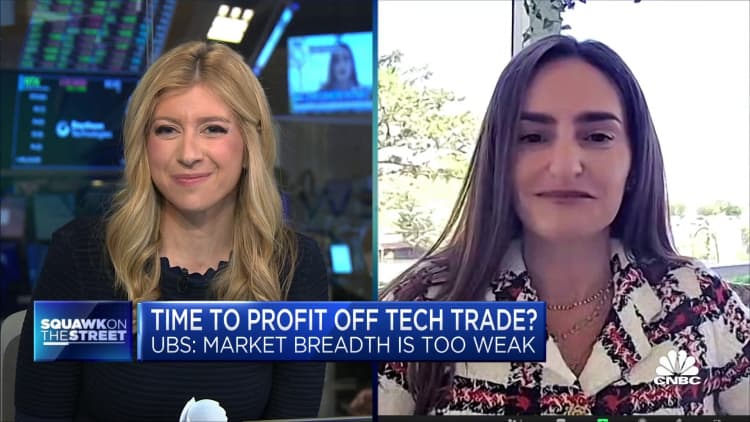Forget the debt ceiling. Tech investors are in buy mode.
of Nasdaq The Composite Index posted its fifth straight week of gains on Friday, gaining 2.5% over the past five days and up 24% so far this year, well ahead of other major U.S. indices. The S&P 500 is up 9.5% year-to-date, while the Dow Jones Industrial Average is down slightly.
Excitement Surrounding Chip Makers NVIDIA’s This week’s rally was driven by explosive earnings reports and the company’s leadership position in artificial intelligence technology, but investors also microsoft, meta and alphabeteach has its own AI story to tell.
And optimism that lawmakers are nearing a deal to raise the debt ceiling and that the Federal Reserve may be slowing its pace of rate hikes has led to more optimism this year than 2022. is becoming more like a high-tech market. 10 years before that.
“This market has been home to focus on mega-cap tech stocks,” Victoria Green, chief investment officer at G-Squared Private Wealth, said in an interview on CNBC’s Worldwide Exchange Friday morning. Told. “You can’t deny the potential of AI, and you can’t deny the earning power these companies have,” she said.

At the beginning of the year, headcount reduction and cost reduction were major themes in the tech industry. Meta, Alphabet, Amazon Microsoft and Microsoft have cut thousands of jobs in the wake of 2022 earnings growth and weak stock prices. In their earnings call, they emphasized efficiency and their ability to “do more with less,” a theme that resonated with the Wall Street crowd.
But as companies show off real-world applications of long-hyped technologies, investors are shifting their focus to AI. OpenAI has seen explosive growth since it released the chatbot ChatGPT last year, and its biggest investor, Microsoft, has embedded its core technology into as many products as possible.
Meanwhile, Google touts its rival’s AI models at every opportunity, and Meta CEO Mark Zuckerberg would rather tell shareholders about the company’s AI advances than money-wasting Metaverse efforts. I believe.
Enter Nvidia.
The chipmaker, best known for the graphics processing units (GPUs) that power advanced video games, is riding the AI wave. The company’s stock surged 25% this week to a record high after first-quarter earnings beat expectations, boosting the company’s market capitalization to nearly $1 trillion.
Nvidia’s stock is up 167% this year, topping all companies on the S&P 500. The next top three companies in the index are also tech companies. Advanced Micro Devices and Salesforce.
Nvidia’s narrative is based on what’s to come, with revenue down 13% year-over-year in its most recent quarter, driven by a 38% decline in its gaming division. But the company’s revenue forecast for the quarter beats Wall Street’s forecast by about 50%, and CEO Jensen Huang said NVIDIA expects “demand to skyrocket” for its data center products. there are,” he said.
Cloud vendors and internet companies are buying up GPU chips and using them to train and deploy generative AI applications like ChatGPT, according to Nvidia.
“I think at this point in the cycle it’s really important not to go against the consensus,” said Brent Braiselin, an analyst who covers cloud and software companies at Piper Sandler, on Friday’s CNBC show “Squawk on Squawk.” said in an interview with The Street.
“When it comes to AI, the consensus is that big things get even bigger,” Bracerin said. “And I think it will continue to be the best way to stay on top of AI trends.”
Microsoft, which Bracerin recommends to buy, is up 4.6% this week and is up 39% for the year. Meta is up 6.7% for the week, more than doubling in 2023 after losing nearly two-thirds of its value last year. Alphabet is up 1.5% this week, up 41% for the year.
The biggest drag on tech stocks last year was consistent central bank rate hikes. The rise will continue through 2023, with the Federal Fund’s target range rising to 5-5.25% in early May. But some members at the last Fed meeting said weaker economic growth would eliminate the need for further tightening, according to minutes released Wednesday.
Less aggressive monetary policy is seen as a bullish signal for tech and other riskier assets, which typically outperform in a more stable interest rate environment.
Still, some investors fear tech stocks have gone too far given the remaining vulnerabilities in the economy and government. Splits in Congress make it difficult to reach a debt ceiling deal as the June 1 deadline for the Treasury Department approaches. Republican negotiator Garrett Graves of Louisiana told reporters at the Capitol on Friday afternoon that “there are still big gaps that have not been bridged.”
Treasury Secretary Janet Yellen said late Friday that the United States likely has enough foreign exchange reserves to postpone a possible default until June 5.
Ari McCartney, managing director of UBS Private Wealth Management, told CNBC’s “Squawk on the Streets” on Friday that the recent rally in tech stocks “will probably take some of it off the table. The time has come,” he said. Her group has spent a lot of time observing the venture market and where deals are taking place, and she has noticed some definite bubbles, she said.
“You are either AI or you are not,” McCartney said. “We need to be prepared to see what it means if we don’t get the perfect debt ceiling, if we don’t get the perfect landing, because at levels like this, the United States The debt ceiling is definitely priced in. Everything is lofty and seems like a very dangerous place to be when you consider the risks.”
clock: CNBC’s full interview with UBS’ Ali McCartney


































